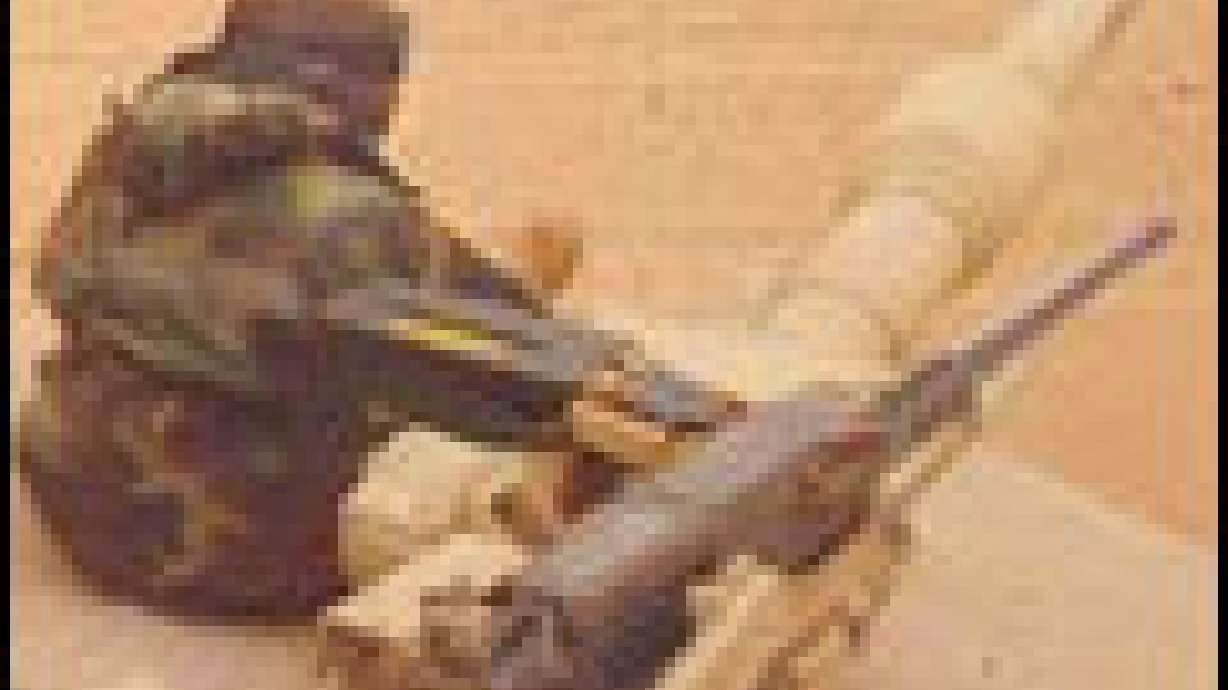Estimated read time: 4-5 minutes
This archived news story is available only for your personal, non-commercial use. Information in the story may be outdated or superseded by additional information. Reading or replaying the story in its archived form does not constitute a republication of the story.
IN THE IRAQI DESERT (AP) -- Artillery and rocket barrages set buildings on fire and raised a pall of thick, black smoke over Nasiriyah on Friday as Marines outside the Euphrates River city tried to stamp out Iraqi resistance on a key supply route to Baghdad.
The battle gave a sample of the kind of firefight that may await coalition forces in the capital, 200 miles to the north.
With U.S. forces massing as close as 50 miles from Baghdad, helicopter gunships tried to wear down Saddam Hussein's best fighters protecting the approaches to the city. In the 101st Airborne Division's first known offensive mission of the war, its Apaches hit tanks and installations of the Republican Guard.
Two Apaches crashed as they returned to the 101st's base in a remote part of the southern Iraqi desert, but all crewmembers escaped injury.
In Iraq's second largest city, Basra, U.S. warplanes firing laser-guided missiles destroyed a building where 200 paramilitary fighters were believed to be meeting. The paramilitaries, known as Saddam's Fedayeen, have kept a fierce grip on Basra even as British forces encircle the city.
All day, Marines fought pockets of Iraqi fighters in and around Nasiriyah. Cobra helicopters fired rockets into the city, raising plumes of white smoke. Artillery and tank fire rumbled, sparking bursts of white flame low on the horizon. Helicopter crews drew almost continuous small arms fire and rocket-propelled grenades.
Four Marines with the 1st Expeditionary Force were reported missing.
Heavy smoke from a burning power plant poured over the city of 500,000, and other buildings were also on fire. In Nasiriyah's eastern neighborhoods, some buildings were reduced to shells, with debris scattered in the streets.
U.S. forces were trying to clear the strategic road around Nasiriyah, which lies at a junction of highways leading up to Baghdad and has been the scene of fierce fighting the past week.
In the chaos, progress elsewhere on the Iraqi battlefield seemed distant.
But further up the road, troops were pushing north toward Baghdad with food, fuel and other supplies. North of Najaf, the Army's V Corps defeated paramilitary attacks, military officials said.
Air attacks focused on the Republican Guard's Medina division.
F/A-18s from the USS Kitty Hawk in the Persian Gulf attacked a fuel depot and another site with missile canisters belonging to the Medina division, said Capt. Dick Corpus, chief of staff of the Kitty Hawk battle group. Royal Air Force pilots also hit Republican Guard positions 60 miles southeast of Baghdad.
"There was fantastic visibility and I could even see the camels on the ground as well as a number of bomb craters around the encampment," Flight Lt. Scott Morley, a Harrier pilot, told a reporter for Britain's Sunday Express. "I got two good hits on Medina division artillery pieces."
At least 1,200 troops are in place in northern Iraq, and special operations forces have secured air fields and other strategic targets in the west.
The big target is Baghdad. "We'll attack when we're ready," Air Force Gen. Richard Myers, chairman of the Joint Chiefs of Staff, said.
But they won't be ready until more forces reach the environs of a city where Saddam's forces were expected to mass for a last stand of house-to-house fighting. And continuing attacks by Iraqi irregular forces -- along with almost perpetual traffic jams on roads north -- have turned last week's sprints across the desert into a distant memory.
Marine units pushed forward. Instead of trying to avoid engagements, they looked for them, trying to clean out pockets of regime loyalists as they go. Convoys moved day and night, taking food, fuel and other supplies north, traveling in total darkness without headlights.
It's "blue-collar warfare," said Lt. Col. B.P. McCoy, commanding officer of the U.S. Marines 3rd Battery, 4th Regiment. "There's no magic solution to it. It is just the hard-grinding work of patrols."
But they did advance. Authorities said the 1st Marine Expeditionary force was north of Qalat Sikar, 50 miles up the road from Nasiriyah.
Behind them, some pockets of resistance were vanquished. Authorities said the port of Umm Qasr was secured after days of sporadic fighting, allowing the delivery of humanitarian aid for desperate Iraqis.
Elsewhere, battles raged. At Diwaniyah, a Marine died and another was wounded in fighting with irregular Iraqi forces at a cement plant. In Basra, the airstrike appeared aimed at helping break the grip of Saddam's Fedayeen on the city. Central Command said it didn't yet know what happened to the occupants of the targeted building. Earlier in the day, the paramilitaries opened fire on civilians trying to flee the city.
Saddam's Fedayeen were spotted in and around Nasirayah. Some of the Iraqis wore uniforms and others were in civilian clothes, riding in white pickup trucks and taxis. They waved white T-shirts, and then started shooting.
On Thursday, a CH-46 Marine transport helicopter trying to pick up casualties and deliver supplies to Marines in battle was forced to turn back when it came under fire from small arms and rocket-propelled grenades.
(Copyright 2003 by The Associated Press. All Rights Reserved.)









